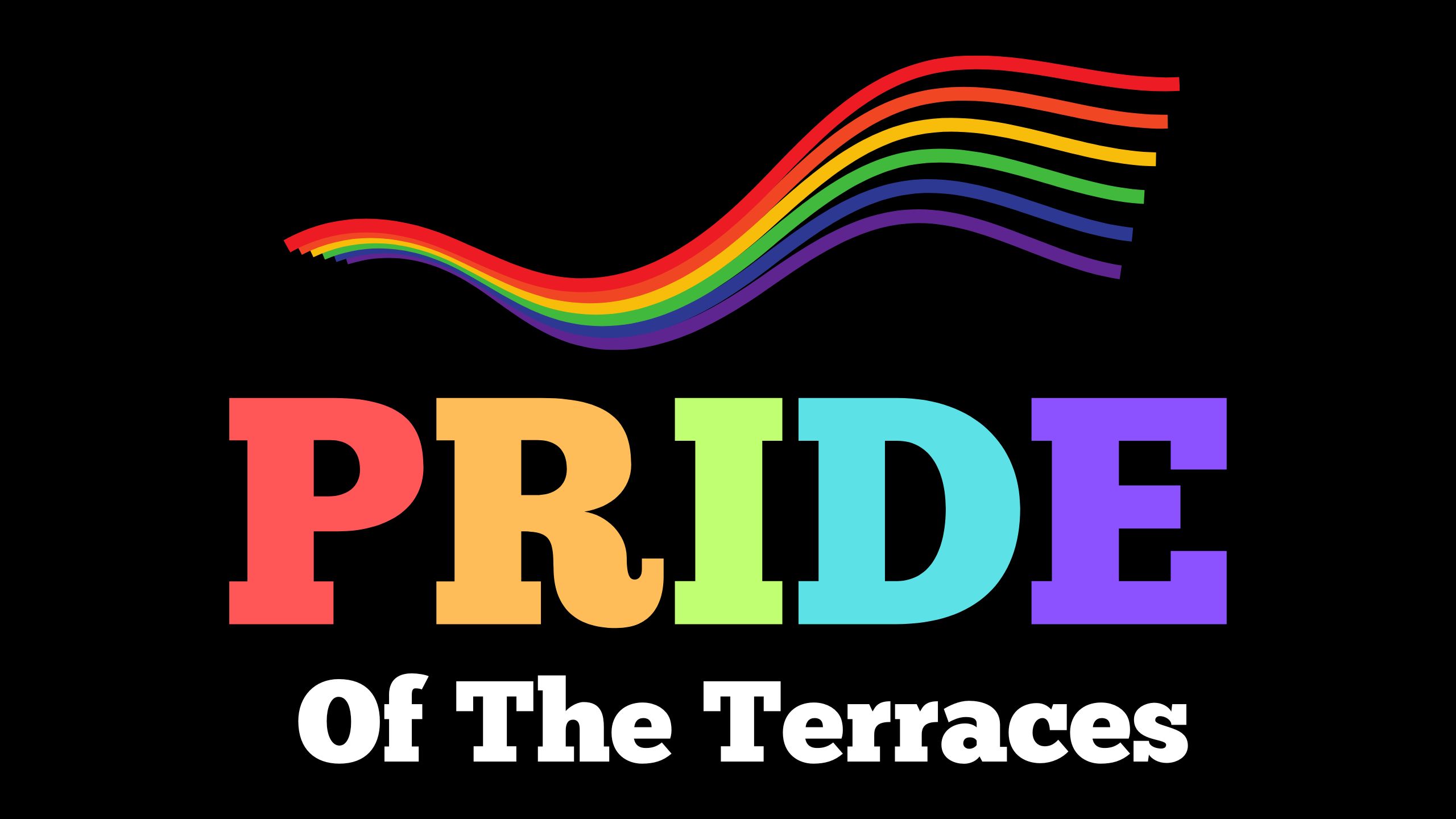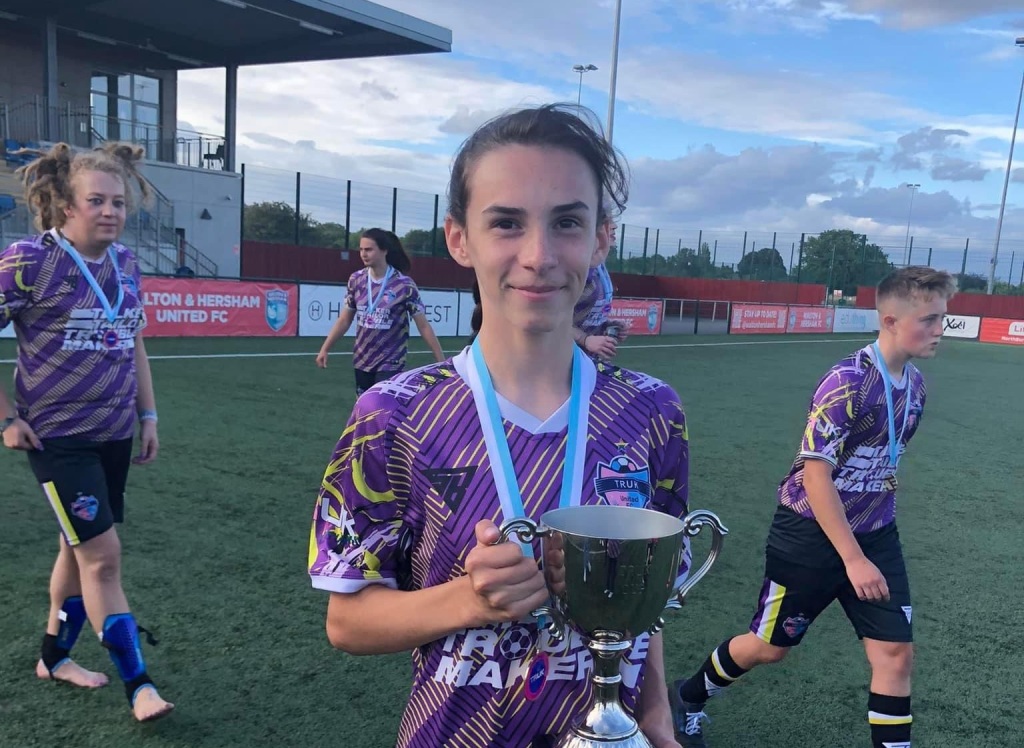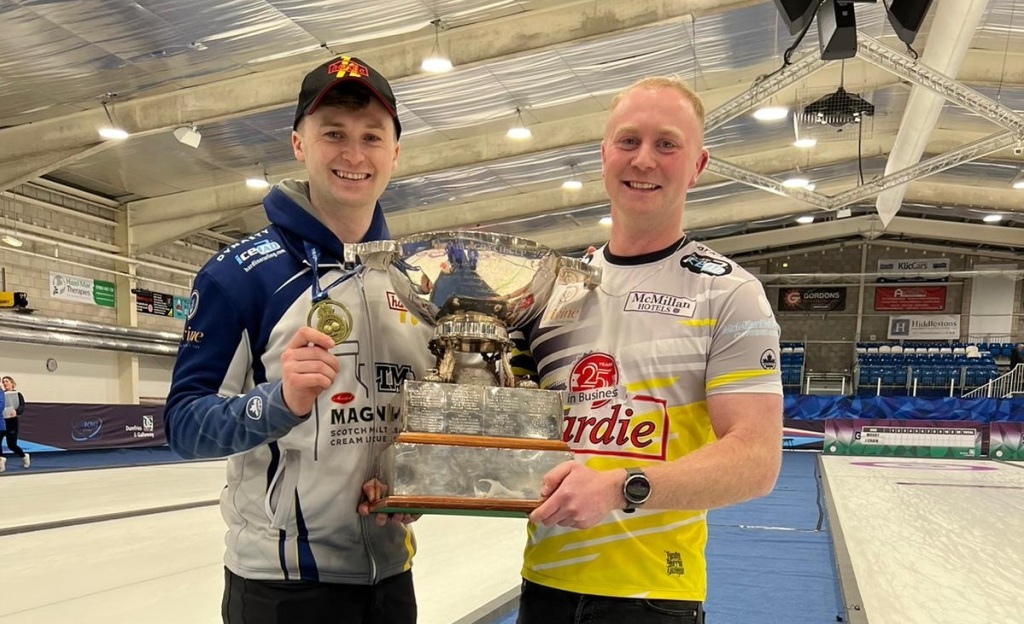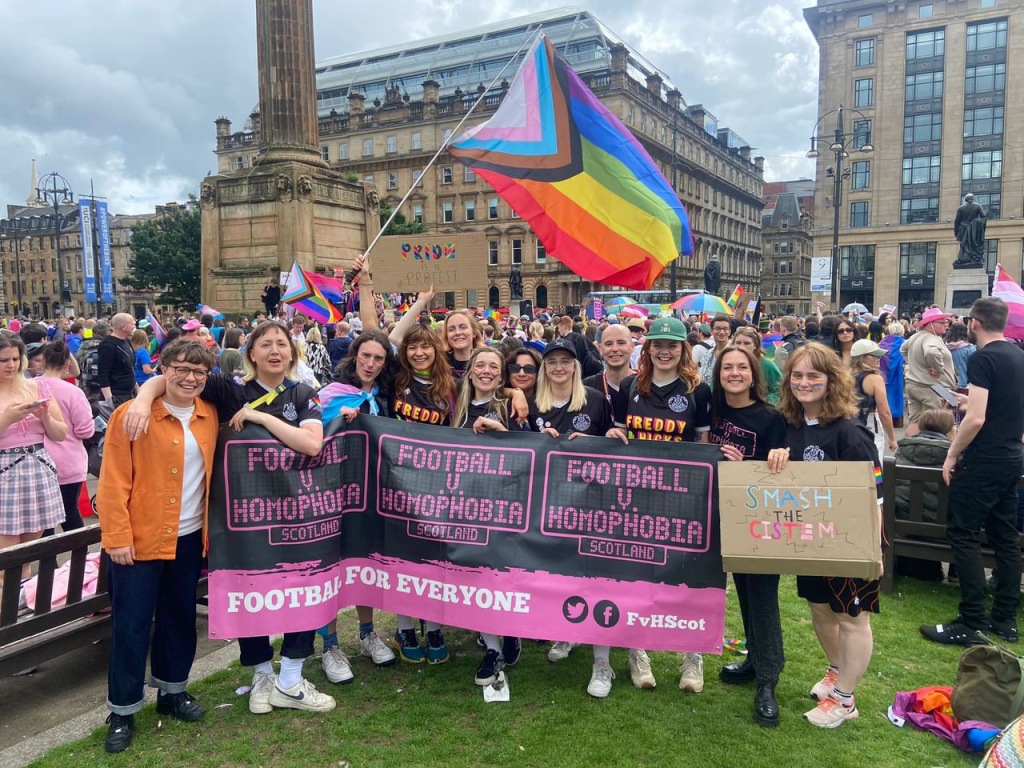If you build it, they will come is a mantra that can certainly be applied to one queer-owned gym in Glasgow.
Uplifted Titans provides access to strength training, sport and fitness for people who face barriers accessing mainstream spaces, incorporating support workers and experiences coaches to deliver trauma-informed sessions.
Originally the brainchild of co-founder Sam McPherson, based on their experience of working in the women’s sector and as a personal trainer as well as their own background with using strength training to move past trauma, Uplifted received charity status in 2020 and has grown exponentially since then.
It was important to McPherson from day one that the space be informed by lived experience, and as physically and financially accessible as possible.

That ensures that anyone who may be hesitant about getting involved will be met with understanding, and a space that was designed to be as inclusive as it could be for them.
Given so much forethought had gone into the project, it is perhaps unsurprising that the feedback McPherson has received has been nothing but positive – although it did seem to shock McPherson themselves.
“You don’t know what someone needs unless you experience it yourself,” they said.
“We get a lot of stories shared with us about how it’s felt to come to our space and come to our classes. People say they felt more trust in what we were doing because they also knew that we were queer, and we have the lived experience.
“People say they feel safe in the space, and we’ve got a lot of neurodivergent people so we try every single time to learn from the people that we work with. We explain and demo things and we give space and time for different ways of learning, and a lot of people say that was different to what they experienced before or what they were expecting.
“I had a message from someone that did our first ever course that said they went on to get a job after that, and it was because they had the confidence from finding a community on the strength course that we had done. They had been quite isolated, but they ended up getting a job with the National Theatre or something, which they really wanted to go into but they never had the confidence to go forward for an interview.
“That was totally unexpected to me. I did not think beyond what we were doing in that way, but one of the main things we’ve heard about from people is the social isolation. People do our courses, then they become friends and then it builds the community.
“It’s the same with the non-gendered competitions that we run, and the feedback from that is just joy. It’s just queer joy on the day, we’re not focusing on the trauma.
“I know what strength training did for me. I experienced some traumatic events when I was younger, and I was also just struggling with my own anxieties and mental health. Very unexpectedly, I found something like strength training so impactful in a way that other support hadn’t clicked with me.
“Changing the way you see yourself, having ownership of that, seeing what your body can do – there’s a quote, ‘seeing what your body can do, not what’s happened to it’, and that sums it up.

“I’ve had first hand experience of what it feels like to change and have ownership, and have that bodily autonomy, that sometimes you feel has been taken away from you. When you can do something like strength training, you surprise yourself. There’s no way I thought I’d be able to do – I hadn’t been socialised to think I could do that.
“I was like ‘I’m taking up space here, this is great’, but I also started to see my body so differently and that was really cool to me. Seeing what you’re capable of and feeling strong is something that can be really healing.
“I think I thought that just because I saw this as something that I experienced the benefit of, doesn’t mean anyone else will. It’s like almost each time I see that it’s working, I’m surprised that it’s working.
“There are people that say that they basically don’t go out at all apart from the one day they come to our course, so it’s definitely had an impact on people’s lives outside the gym. When you’ve got word of mouth from within the community, that’s so valuable because that means that we’re doing something right, and people are benefiting.”
If McPherson needed any proof of the impact Uplifted has had over the last few years, they need only look to the non-gendered competitions that they have been able to put on.
As with the vast majority of sports, strength, weightlifting and powerlifting competitions are all heavily gendered, meaning it is rare that non-binary people get the opportunity to take part in such events.
Uplifted took a different approach. Dividing up into categories based on strength and experience, the first competition was years in the making – and had an overwhelming level of support from competitors and spectators alike.
“The sport of strongman, like the stones, pulling trucks, it’s very inclusive in some ways but it’s very gendered,” McPherson reasoned.
“You’ve got loads of these competitions, but there’s not really a space for people that are more fluid or non-binary or trans to see that there’s a competition they can aim for. Some people want to do that but it doesn’t exist, and I was constantly talking to people at Uplifted who would have loved to see if they could do a first-timers competition, but where were they going to go?

“You can still have that competitive element without alienating and excluding a load of people. I wanted to do it for three years, and I was trying to think of how to do it, and then I met Dee Wilson who is my partner in crime and runs Uplifted with me.
“She is a three-time Scotland’s Strongest Woman, she is a pro athlete, but she’s also a queer person and she understands what I’m trying to do. After we came together I realised we can actually put on this competition that I’ve thought about for so long.
“Dee’s got sponsorships and people from the community and businesses on board, so we were able to put on the first non-gendered strength competition in Scotland.
“It was amazing, because my main goal is to remove barriers, and we had this evidence in front of us that what we’re doing works. We had first timers through experienced people across four levels, we had trophies, podiums, sponsors, t-shirts, medals – everything.
“We had people on the podiums, at different levels, who had never done anything before Uplifted. It was queer people, people of colour, disabled people, people that had openly said they would not have been able to access this who then had the confidence to do a competition.
“We were standing back thinking this is evidence that if you increase access and remove barriers, it actually works. I was blown away by it.
“All four levels were full of competitors, and spectators-wise it was just beautiful. The atmosphere was amazing. There was a lot of people that turned up just because they wanted to support what we were doing and wanted to support the people involved, so it wasn’t even always people who were friends and family of the competitors.
“We did not expect it, I don’t think we were fully prepared for how many people wanted to come along. The turnout was wonderful, and in the photos you can see how many people are there shouting and screaming for each other. The support on the day was amazing.”

While the full, non-gendered competition takes a lot of work to put on, Uplifted also put on more regular, smaller events to give people something to aim for and work towards.
Last year, for example, they ran a maximum deadlift event , and more recent they ran an overhead lift where attendees could choose a barbell, a dumbbell, a log or some combination of the available equipment and compete against themselves to lift their heaviest weight.
Next up will be a 10-tonne challenge on June 30th as part of Leap Sports Scotland’s Festival Fortnight, which also doubles up as the unveiling of Uplifted’s new gym space in Glasgow. There, anyone who can either already lift or wants to learn how to get involved can lift, with the goal of collectively reaching 10 tonnes by the end of the day.
People can also take part remotely by sending in a clip of them lifting, which will be counted towards the total weight on the day.
McPherson is hoping that having their own space will let them have more control over their future, and is optimistic that exciting times lie ahead after what has already been an extremely productive few years for Uplifted.
“We’re just so excited to be able to just have our own private space that we can offer to the queer community,” McPherson said.
“We’re in talks with a lot of funders and we’re looking at a more self-sufficient and self-sustaining model, so we’re able to offer a semi-private membership as part of it. We’ve got our PT clients, and then the queer community, but at the moment we’re developing more of a class timetable now that we’ve got full control of our own space.

“People who do have access to funds reach out to us and are like ‘we want to be part of it, but we don’t know how’ because it was just funded courses before.
“We want to do more strength courses, more social events, more competitions. We’ve got our second non-gendered competition in July and that’s the big focus after the open day. It’s really focusing on our events and also our courses, access to the space and running classes with a timetable.
“We do what I call an open gym, where people who have done our courses can come in and continue to meet as more of a social thing. It was really important for me to not run a 12-week course and then leave everybody, we wanted to offer follow on things so they can still be involved.
“We’ve got people right from our first ever course that still come even though we’ve changed location, so we run these open gyms and people can come along who have done our courses who are clients, or who are queer people who want to access a gym.
“Our plan is that it’s not just going to be one evening a week that we can offer something, it’s going to be a space where have something on most nights and that means that more people can come and access it and book in.
“This space is allowing us to do that, we just didn’t have that control before to offer those opportunities.
“For us the thing that’s so important is just that everything is informed and led by the community, by the people involved.

“We’re really privileged that we get the feedback we get because people feel safe to tell us this thing didn’t work, or it could have been improved, or there was this bit that someone couldn’t access in the same way.
“Our new space is physically accessible, it’s ground floor, a shutter entrance so you can just come straight in.
“It allows us to shape things, so for me the core of Uplifted, and especially now Uplifted Titans, is that it’s informed by the community, informed by the family that we’ve built with it, but also just run by people with lived experience because that’s how you make it work, and that’s when it feels meaningful.”
As for strength training more generally, McPherson would love to see their example lead to bigger and better events for anyone to enter, adding: “We want to provide more ways for people to get involved with Uplifted Titans, and really focus on building a proper community for the non-gendered strength comps.
“You’ve got strongman, you’ve got strongwoman, the sport started in car parks and now you’ve got people who are selling out arenas and putting on these big shows, getting TV coverage with more and more promotion behind it.
“Why can’t we create something that’s important, that deserves space to actually be grassroots-level beginner, but also offer the opportunity for competition-level athletes if they want to do that? Giving that access and that opportunity is where we want to go with it.”






Leave a comment